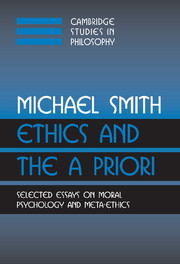Book contents
- Frontmatter
- Contents
- Preface
- Sources
- Introduction
- Part One Moral Psychology
- 1 Internal Reasons
- 2 The Incoherence Argument: Reply to Schafer-Landau
- 3 Philosophy and Commonsense: The Case of Weakness of Will (co-authored with Jeanette Kennett)
- 4 Frog and Toad Lose Control (co-authored with Jeanette Kennett)
- 5 A Theory of Freedom and Responsibility
- 6 Rational Capacities
- 7 On Humeans, Anti-Humeans, and Motivation: A Reply to Pettit
- 8 Humeanism, Psychologism, and the Normative Story
- 9 The Possibility of Philosophy of Action
- Part Two Meta-Ethics
- Index
- References
8 - Humeanism, Psychologism, and the Normative Story
Published online by Cambridge University Press: 04 December 2009
- Frontmatter
- Contents
- Preface
- Sources
- Introduction
- Part One Moral Psychology
- 1 Internal Reasons
- 2 The Incoherence Argument: Reply to Schafer-Landau
- 3 Philosophy and Commonsense: The Case of Weakness of Will (co-authored with Jeanette Kennett)
- 4 Frog and Toad Lose Control (co-authored with Jeanette Kennett)
- 5 A Theory of Freedom and Responsibility
- 6 Rational Capacities
- 7 On Humeans, Anti-Humeans, and Motivation: A Reply to Pettit
- 8 Humeanism, Psychologism, and the Normative Story
- 9 The Possibility of Philosophy of Action
- Part Two Meta-Ethics
- Index
- References
Summary
What explains an agent's actions? Many different answers can be given to this question. But the mark of the answers in which philosophers have principally been interested is that they purport to be constitutive answers, that is, answers of a kind whose absence would mean that the event under consideration isn't an action at all. Humeanism – the claim that actions are to be explained by an agent's wanting some outcome and his believing that what he is doing is something that he can just do that will bring that wanted outcome about – purports to be such an answer. If we have an event for which such a belief-desire explanation cannot be given then, according to Humeanism, we do not have an action at all but, rather, something that merely happened.
Humeanism is intimately related to the truism that whenever an agent acts there is some description of what he does under which he does what he does intentionally, or, equivalently, for a reason (Davidson 1963). I take it that the link between Humeanism and this truism is supposed to run thus. It is constitutive of an agent's actions that, under some description, they are done for reasons. But since an action is motivated behaviour, these reasons must be the motivating reasons the agent has for doing what he did. So the question naturally arises as to the nature of these motivating reasons, and the obvious answer to give is that suggested by Humeanism. Motivating reasons are desire-belief pairs.
- Type
- Chapter
- Information
- Ethics and the A PrioriSelected Essays on Moral Psychology and Meta-Ethics, pp. 146 - 154Publisher: Cambridge University PressPrint publication year: 2004



